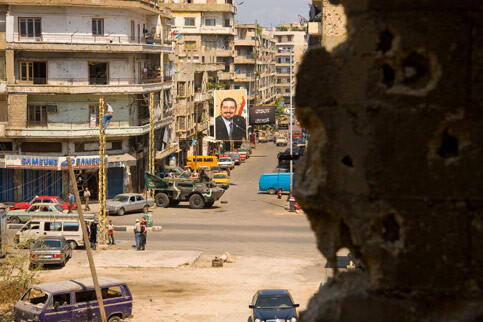Electronic Lebanon 30 July 2008

A view from Allawite-majority Jebel Mohsen across to the Sunni neighbourhood of Bab al-Tabbaneh. Clashes between fighters from the two sides since June have killed 23 people, injured hundreds and displaced nearly 6,000 families. (Hugh Macleod/IRIN)
TRIPOLI, LEBANON (IRIN) - A few hours after evacuating their bullet-riddled three bedroom flat on the street which divides Sunnis from Shia Allawis in Tripoli’s poorest neighborhood, Khaled Mansour and his new wife were woken by the sound of their front room exploding.
“The rocket came through the window at dawn,” said the 23-year-old accountant with scraggly black beard and traditional white tunic, who had moved his veiled wife and mother into his uncle’s flat next door.
“Last time it was bullets. This time it was an RPG [rocket propelled grenade],” said Mansour, a Sunni Muslim from Tripoli’s Bab al-Tabbaneh neighborhood, looking through broken glass at the adjacent Allawite-majority area of Jebel Mohsen.
“I am trying not to carry a gun and go to the front line but we are being dragged into the fight. It’s as if someone is saying ‘If you do not join the battle we will destroy your house.’ But I will not fight but ask God to take his revenge.”
Since June, long-standing historical grievances between Tripoli’s 500,000 Sunnis and its 50,000 Allawis have flared into a deadly and intractable armed conflict, fanned by political tensions in Beirut, which has now killed 23 people, injured hundreds and displaced nearly 6,000 families, according to officials.
The upsurge in fighting between Allawis — who support the Hizballah-led opposition and have ties to the Allawi ruling class in Syria — and Sunnis, who are backed by the Sunni-majority anti-Syrian March 14 coalition, began on 25 July, following the break-down of the latest in a string of temporary cease-fire agreements.
The army has deployed in both neighborhoods but has been unable to force either side to maintain a ceasefire.
Sunni families flee
Vice-President of Tripoli Municipality Ahmed Kamer al-Dine said some 2,300 Sunni families from Bab al-Tabbaneh had fled their homes over the weekend, finding shelter in 11 schools.
The fragile ceasefire which had mostly held during the first two days of the week had allowed many to return home, he said, leaving around 700 families still sheltering in the schools.
UN Children’s Fund (UNICEF) health officer in Tripoli Fatima Odaymat said most families from Bab al-Tabbeneh had fled their homes out of desperation for food.
“They are starving,” she said. “They earn their daily bread from their daily work, but they are not able to work any more.”
Bab al-Tabbaneh is one of the poorest areas in Lebanon, with child labour rife and a school drop-out rate of some 80 percent, according to UNICEF.
UNICEF estimates that around 3,500 Allawi families have fled their homes over the past month for villages in the northern Akkar area, or had crossed the near-by border into Syria.
Tripoli has long been a conservative Sunni-majority city and a bastion of support for the Sunni Future movement led by Saad Hariri. Future party workers have set up tents and are distributing free meals three times a day to the displaced families. The municipality has also established a fund of around $13,000 US for health needs, which include chronic diseases and hygiene.
“These clashes are driven by poverty and the political conflict,” said Tripoli Municipality’s Kamer ad-Dine. “It is not a sectarian problem but a political one.”
Since May’s Qatar-brokered accord ended a near two-year often violent political stand-off between the Western-backed ruling majority and the Iranian and Syrian-backed opposition, the new cabinet has been at loggerheads over the status of Hizballah’s arms.
“The weakest link”
Leaders in both Jebel Mohsen and Bab al-Tabbaneh portray their conflict as a mix of history, sectarianism and current politics. During parts of Lebanon’s 1975-1990 Civil War, Syria’s military controlled Tripoli and many Sunnis say they were persecuted while Allawis were supported.
Syria was forced to withdraw its military from Lebanon in 2005 following the assassination of former premier (and Saad Hariri’s father) Rafiq Hariri.
“As long as there is a political problem in Lebanon the weakest link will be Tripoli,” said Sheikh Bilal Matar, a former member of Islamist group Tawhid and a leader in Bab al-Tabbaneh.
“The sectarian split exists but it is affected by the political split. When the Syrians withdrew, Jebel Mohsen became their new front line in Tripoli. We will never allow them to return as we had a very bad experience with Damascus.”
For Rifat Eid, the leader of the Allawi community in Jebel Mohsen, the Sunni fighters arranged against him represent an existential threat.
“In Tripoli most people are with Hariri but they never gave us rights as Allawis,” said the young man sitting beneath a portrait of Syria’s former President Hafez al-Assad.
“We want good relations with the Sunnis, but they have recruited 3,500 Islamist fighters who have no mercy. Where there is poverty these Salafis [Sunni fundamentalists often associated with the Wahhabis] thrive. But we have made our choice: we will never leave this mountain except in coffins.”
This item comes to you via IRIN, a UN humanitarian news and information service, but may not necessarily reflect the views of the United Nations or its agencies. All IRIN material may be reposted or reprinted free-of-charge; refer to the copyright page for conditions of use. IRIN is a project of the UN Office for the Coordination of Humanitarian Affairs.


